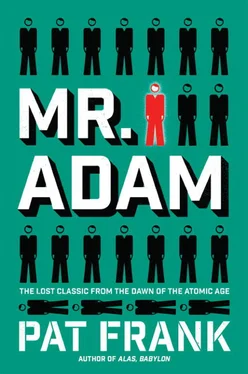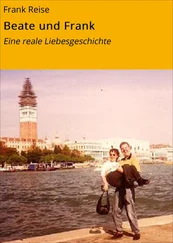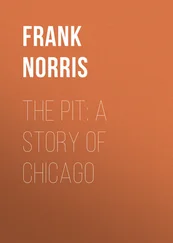“You sane and sober, Steve?” J.C. inquired.
“Certainly.”
“Did you say Adam?”
“Honest to Christ, J.C., it is Adam A-D-A-M.”
“You will,” J.C. ordered quietly, “give me a bulletin to follow flash within five minutes. You will then dictate a complete story, and don’t hesitate to call in with new leads and inserts. Why this is the biggest story—”
“Since the Creation,” I suggested.
“No,” he said quietly, “just the biggest since Mississippi.”
The history of Homer Adam, until the day he became the world’s lone post-Mississippi father, would not have earned him more than a three-paragraph obituary in his home-town newspaper, even if he had died an unusual and violent death.
He was born in Hyannis, Nebraska, a small but prosperous cattle town. His great-grandfather had crossed the plains in a covered wagon (something of which the editorial writers made much when the repopulation schemes were being considered). His grandfather was a cattleman, and his father was a wholesale grocer.
As a boy he was rather shy, and spent more time collecting stamps and Indian artifacts than he did playing football or riding and hunting. “You see,” he confided in me, “I was much too tall for my age. The older, but smaller boys used to beat me up. I think it gave me an inferiority complex.”
He wanted to be an archeologist, but his parents didn’t think it was practical. He compromised on geology, and they sent him to the Colorado School of Mines, where his record was good enough to get him a job with the Guggenheims immediately after graduation. When war came, the Draft Board doctors, examining his gangling form, at first classified him as 4-F, but he probably would have attained 1-A eventually had not the government found a use for his special qualifications and dispatched him to Australia.
Living in a little mining town planted in the desert near Alice Springs made him homesick, and he became a prodigious letter writer. He wrote all his letters to Mary Ellen Kopp, a secretary in the Guggenheims’ New York office. When he returned from Australia they were married, after a suitable engagement period.
These were the main facts, as he gave them to me while we sat in the living room of the gatehouse, waiting for his baby to arrive. However, they were not the principal things I wanted to know, but the birth of the Adam daughter interrupted my questioning.
It was not until much later—after Mr. Adam had seen his baby, and Marge had gone back to our West Tenth Street apartment (because there would be no room for her in the gatehouse that night) and I had peeped in on the mother and baby—that I found an opportunity to ask Homer the really pertinent questions.
We were sitting in the living room, and I had shoved another highball into Homer’s hand, and had complimented him on both his wife and his child. Mary Ellen was a buxom, lusty young woman who, Dr. Blandy assured me, had gone through childbirth with considerable fortitude. “It was simple,” he said, “as popping a peanut out of the shell.” And the baby, as newborn babies go, could be classified as cute.
“I’m sorry,” I explained, “that I have to ask all these questions at this time. I know—and it’s quite natural too—that you’re excited and upset. But it will save you a lot of trouble in the end, because you’ll only have to answer them one time. All the reporters in New York will descend on this place before long, and I don’t know who else besides, and if you give me all the answers I can handle them. This way, it won’t bother you or your wife.”
Homer shuddered, like a tall, thin, unkempt pine in a fitful breeze, and swallowed his drink. “Why did this have to happen to me?” he moaned.
“Don’t be a damn fool,” I said. “You’re a very lucky and remarkable man. Why, you’re the luckiest guy on earth.”
“But what I cannot figure out,” Homer said, “is how it happened. Please give me another drink. I think I ought to get tight, because you see I’m scared.”
I poured him another drink, more rye than soda. He took a swallow and choked on it, water filling his eyes. “Easy!” I cautioned. “Just tell me, where were you on the day Mississippi exploded?”
“In Colorado,” Homer replied. “The boss sent me to investigate the possibility of reopening some old silver and lead workings.”
“Exactly where in Colorado?”
“Well, near Leadville. I spent the whole day in the lowest level of Eldorado No. 2. You know that’s one of the deepest shafts in the world. Certainly the deepest lead workings. I was very much surprised when I went into Leadville that night—it was a Sunday—and they told me about the flash in the sky, and later I heard on the radio about the explosion.”
I didn’t have to know as much about physics as Professor Pell to guess the reason for Homer Adam’s miracle. “When the explosion came,” I said, “you were probably completely shielded from the world by lead?”
Mr. Adam considered this. “Yes,” he said finally, “I suppose I was. The lead and silver ore in the lowest level is as rich as you’ll find anywhere in the world. Hardly economical, though, because of—”
“Let’s forget about it, from the mining viewpoint,” I suggested. “Let’s consider it from the viewpoint of the rays from the explosion.”
“If lead protects you against radioactive rays,” said Homer, “I suppose I was better protected, more than a mile down there, than any other man in the world.”
“It certainly seems so,” I said, “considering the known facts. Was there,” I asked hopefully, wondering whether any other still potent males existed, “anybody else down there with you?”
“Oh, no,” Homer replied. “You see Eldorado No. 2 has been abandoned for a generation or more. There are watchmen at the mine, but they only operate the elevators, and guard the machinery, and inspect the shafts for drainage. They rarely go into the lower levels.”
The next few days, I would just as soon forget. It was like the Dionne quintuplets all over again, except that in this case it was the father, not the mother, in the center ring. There were other considerable differences, and one of them was that every human being, without exception, had a vital interest in Mr. Adam. I describe it inadequately. For the human race, the welfare and future of Mr. Adam was literally a matter of life and death.
I was hounded, harassed, heckled, harried, quizzed, questioned, cross-examined, badgered, and browbeaten by the ladies and gentlemen of my own profession until I did not know which end was up, or care much.
The first thing I did was borrow a technique that had proved successful in war coverage. I instituted a photographic pool system. This simply meant that instead of dozens of photographers swarming over the gatehouse, one still photographer and one newsreel cameraman were chosen by lot. They made pictures for all companies, newspapers, and agencies.
I arranged press conferences for Homer Adam, Mary Ellen, Dr. Blandy, and Mrs. Brundidge, the tight-lipped trained nurse who took a Scottish general attitude of disapproval regarding all these proceedings. Mrs. Brundidge was even persuaded to exhibit the baby (named Eleanor, for the mother was a firm Democrat). At the same time I managed to furnish the AP with enough exclusive material to keep J.C. Pogey satisfied, and yet not so much that other newspapermen would raise a beef that would exclude me from my strategic post in the gatehouse. Altogether, as I was to learn, I made a pretty satisfactory public relations counsel.
The press conferences, as can be imagined, were largely biological, but how else can a story like this be handled?
Читать дальше












